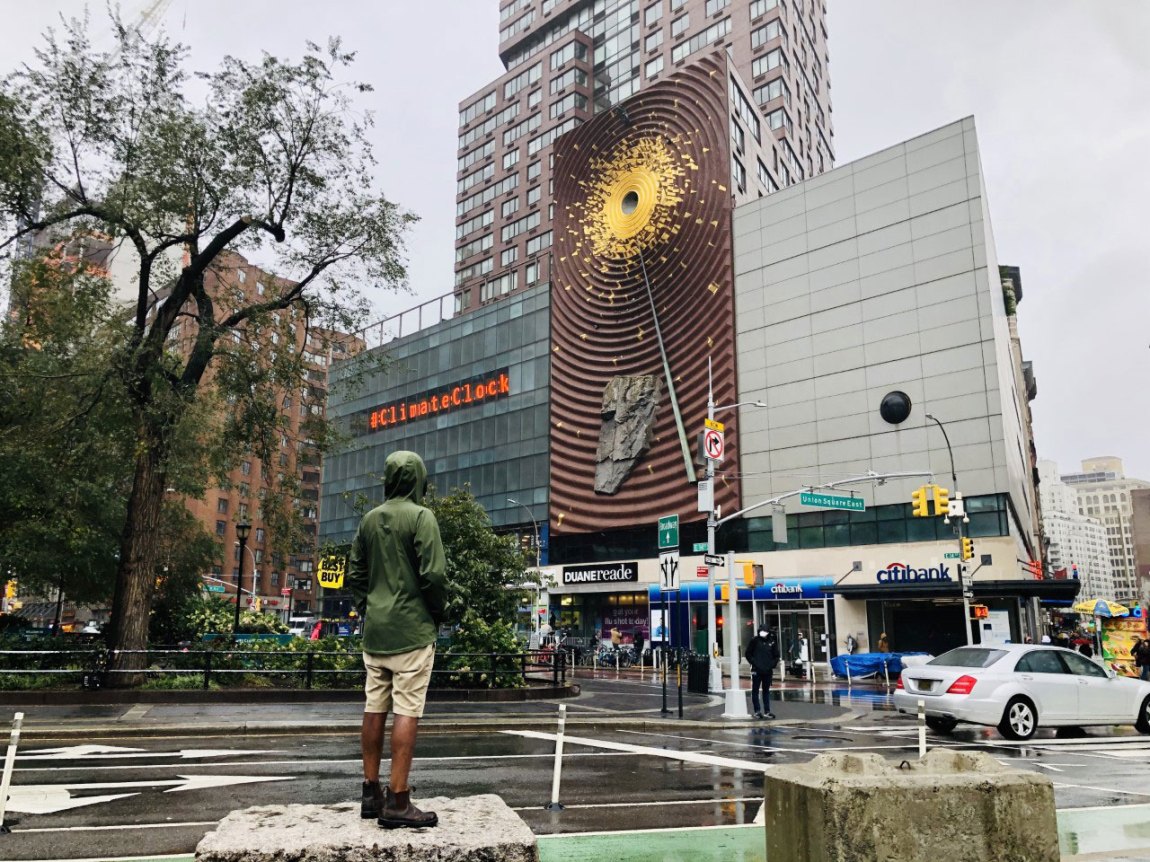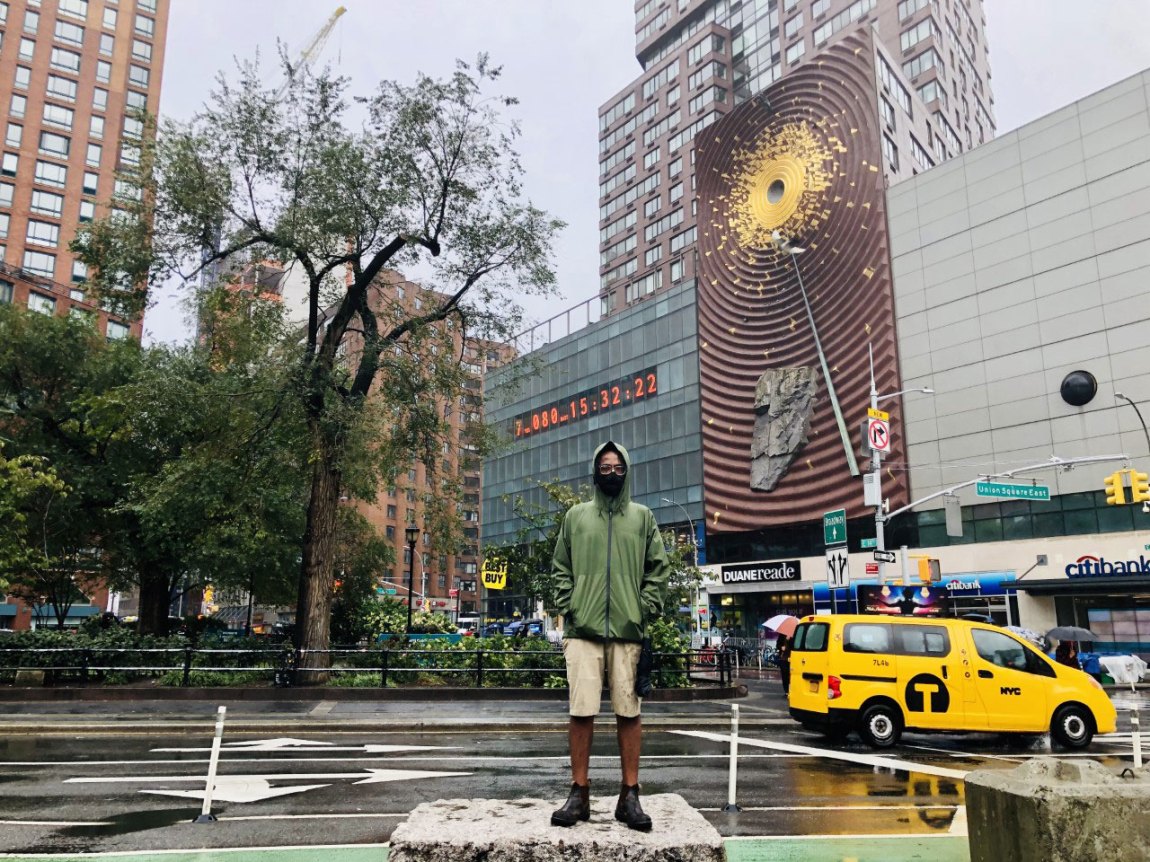Mik and I meet in driving rain under the Climate Clock bordering Union Square. How can we not dwell on doomsday? We’re drenched by the remnants of Delta, the first hurricane named for a letter of the Greek alphabet ever to make landfall in the continental US: so many severe storms needed naming this season that meteorologists ran out of Roman letters. It’s been months since I last saw my friend. Together, we’ve criss-crossed all five boroughs of our coastal city, confronting the effects of climate change. It’s not the same metropolis we walked before the pandemic. Twenty-four thousand New Yorkers have died, disproportionately Black and Latino. Thousands more have migrated, with their tax dollars, to less congested locales. Subway ridership is down 70 percent compared to this time last year. Two blocks down Broadway, the Strand bookshop has reopened at reduced capacity, struggling to stay afloat with 70 percent less revenue. The Regal movie theater one block from the clock remains shut.
Masked, Mik and I cannot read each other’s faces. We bump elbows instead of bumping fists or shaking hands. Gone are the Union Square chess players charging five bucks a game; no Greenmarket stalls today. The public square is empty. The digital clock has been reprogrammed to tell the time remaining to avert climate catastrophe, based on data from the Mercator Research Institute on Global Commons and Climate Change (MCC), creator of the carbon clock. More specifically, it indicates the time left to curb greenhouse gas emissions sufficiently to give Earth a 67 percent chance of remaining below the warming threshold of 1.5 degrees Celsius. When the clock runs out, scientists warn, we’ve reached an irreversible tipping point. “The earth has a deadline,” flashes the LED screen, while counting swiftly down.
Election day draws near. Our anxiety is ten stories high, like the clock. It’s part of Metronome, a prominent mixed-media public artwork, which includes the adjacent wall of concentric circles, at the top of which gestures a replica of George Washington’s hand as it appears in the equestrian statue behind me, seemingly pointing the way toward American democracy. (The work used to blow steam from the hole in its gold-splattered center. When did that stop?) To my eye, the clashing symbols reflect the US paradox. As professor and activist Cornel West has pointed out, the American Revolution interrupted the rule of empire only to uphold forms of domination in an imperial democracy, subjugating the enslaved, indigenous people, women. Empire that replaces empire is bound to implode. We find ourselves now in an “imperial meltdown,” Dr. West says. A “spiritual blackout.”
Although Mik and I are here to see the Climate Clock before election day, we don’t discuss how, during his tenure, the Thug in Chief has called global warming a hoax, filed to exit the Paris agreement, dismantled climate policies targeting greenhouse gas emissions, gutted environmental regulations, undermined public health, left millions vulnerable to the pandemic—denying the virus’s severity and refusing resources to track it—held maskless rallies in defiance of state laws, pissed on public institutions, spread disinformation, flaunted impunity, encouraged white supremacy, devalued science, diminished US standing in the world, and assaulted the norms and values of democracy, costing the nation and the world valuable time to act on these interrelated and urgent crises.
Instead, we recall who we were back when the Citibank at the corner across 14th Street was Tower Records. I remember gathering in the aftermath of the September 11, 2001, attacks in a packed Union Square that had become a vigil site, united with strangers in our stupefied mourning; the spontaneous memorials that arose—candles, pictures of the dead; how intensely we looked into one anothers’ eyes back then, with such empathy and tenderness, attending to our mutual wound. By contrast, today we mourn with social distance, feeling desperate in confinement. How destabilized, under the current regime, are the power of the common good and the state of public trust.
Mik has just returned from registering voters down home in the swing state of Georgia, and, given his possible exposure, is careful about standing too close lest he infect me, though he was symptomatic last spring when it was impossible to get a test. I tell him that when I stuck a Forever Stamp on the envelope holding my ballot and slid it into a mailbox on 181st Street, I didn’t entirely believe my vote would reach its destination. I tell him how my kids’ public elementary school is in such a sorry state of underfunding and disarray, struggling to administer hybrid teaching while the virus rages on, that some formerly committed parents have opted out in favor of paying for private learning pods, reluctantly contributing to the socioeconomic achievement gap. I lament that about a quarter of my colleagues at CUNY were laid off when the budget was slashed, many of them losing health insurance, while local billionaires, like the president, evade taxes.
Advertisement
Institutions and values that benefit public interest are being left to deteriorate—defunded, discredited, or actively dismantled: the post office, public schools, public land, clean air, the belief in scientific integrity, the media, the right to vote. How unnerving it is to be pushed by austerity and top-down selfishness to live in contradiction with one’s ideals. I’m haunted by the recent resignation of architect Lesley Lokko from her deanship at the Spitzer School of Architecture at the City College of New York. Lokko left in an act of self-preservation—she could not do the job with the impossible workload demands, casual racism, and absence of meaningful institutional support. What might she have built in New York with City’s working-class students, impassioned about sustainability? I think, too, of my friend S., an avowed socialist currently siloing his daughter in a private learning pod, cushioned by privilege and discomfited by the self-interest of those in the current administration, which he now sees reflected in his own choices. What else of the commons might be eroded with our unwilling but compelled acquiescence?
Abuse of power, as installation artist Jenny Holzer once put it, comes as no surprise. When I ask Mik if he fears a slide into authoritarianism he says the question doesn’t matter much to him. “We been slid,” he reasons. “Election or not, can we, for the rest of our time here, stop the slide and manage the fear?” What scares me is that the clock is running out on the common good.
Historically, Union Square has been the start or end point for political demonstrations, a site for labor union rallies and radical speeches. As many as a quarter million patriots came together here in 1861 after the fall of Fort Sumter, in support of Union troops. Ten thousand workers paraded through on the first Labor Day, in 1882. Emma Goldman made her Free Bread speech here to a crowd of garment workers in 1893, and rallied here again in 1916 to advocate for free access to birth control. In the 1930s, it was a gathering point for many of the city’s communist and socialist groups. This summer, it was a meeting place for Black Lives Matter protests. Union Square may be empty today, but the residue of all that energy remains. What else is democracy for but hearing and heeding the voices and victims of hierarchies that have dominated and exploited them? Protest, too, is a common good.
Above our face masks, our glasses are fogged, making it hard for Mik and me to read the new clock. Seven years, eighty days, fifteen hours, thirty-two minutes and twenty-two seconds, as of Indigenous People’s Day. And counting.




